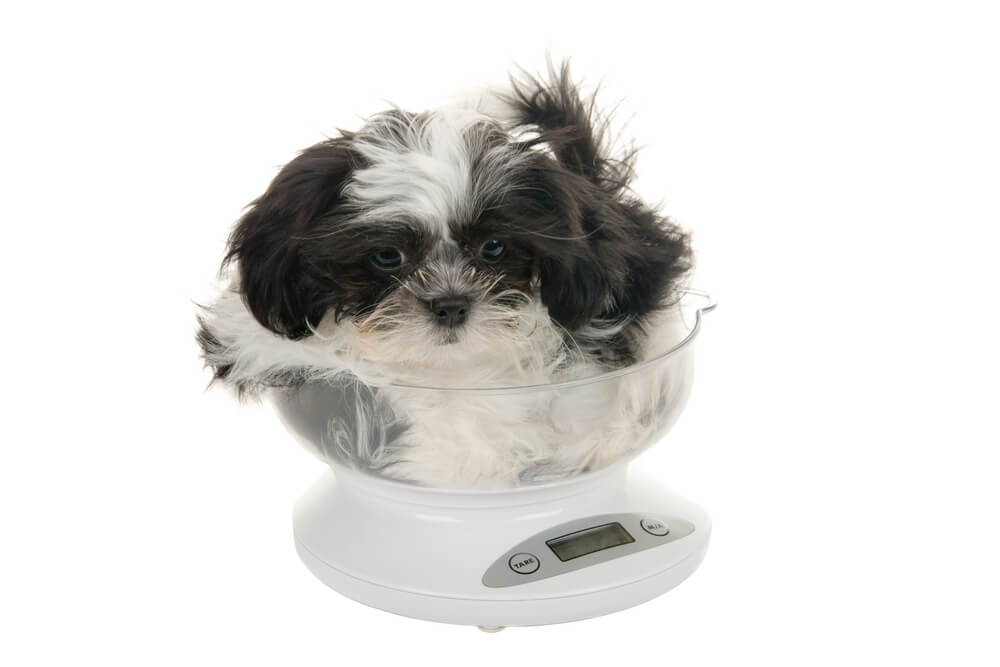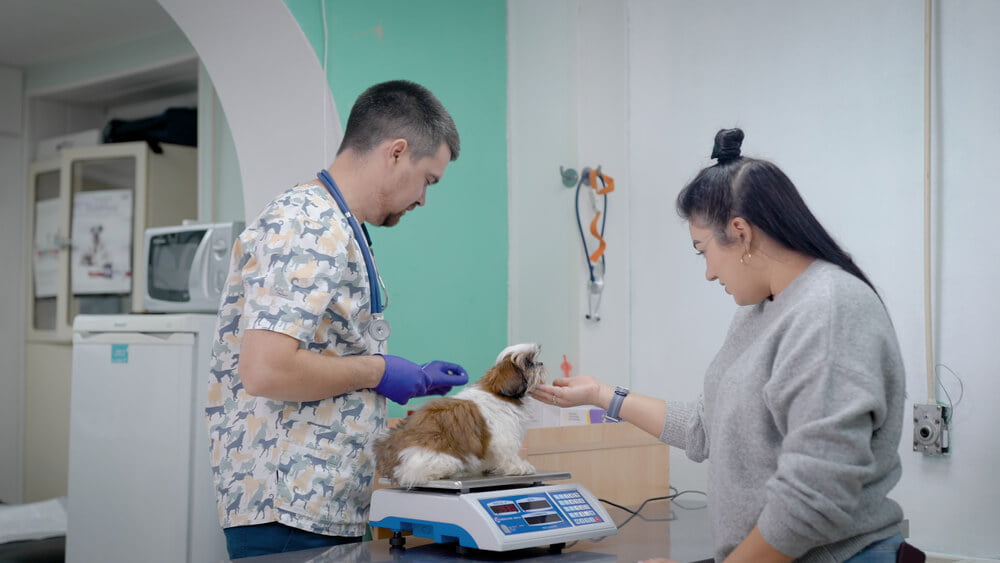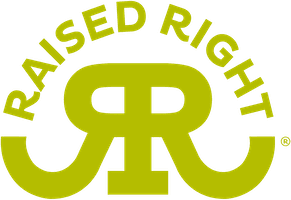If you’re the proud pet parent of a Shih Tzu, you’re bound to enjoy their happy demeanor, lively nature, and love of cuddles and affection. It’s natural to want to lavish them with love and tasty treats, after all, they’re pretty cute! So, how do you ensure that you’re doing everything you can to keep them in their best health? And how do you know if your Shih Tzu is overweight or underweight?
How much should a Shih Tzu weigh?

The most accurate way of determining whether your dog is over or underweight is using their Body Condition Score (BCS).
The ideal weight of a Shih Tzu depends on their age. Unlike many other larger dog breeds, there is little consistent difference between the weight of a female dog and the weight of a male. An adult Shih Tzu should weigh between 9 and 16 lbs, which is around 4 to 7 kg. If a Shih Tzu weighs less than this, they are sometimes termed Tiny Shih Tzus, but this only means that they lie below the breed standard.
Although weight can be a good guide for how much to feed your dog, and give a reasonable indication that they are healthy and growing normally, it’s not foolproof. A far more accurate way of determining whether your dog is over or underweight is using their Body Condition Score (BCS). A dog’s BCS takes into account how easily their ribs and spine can be felt, as well as whether they have a visible waistline. If your dog’s BCS is low, they are underweight, whereas if it is high, they are overweight. There is also a modified BCS chart for puppies to take account of their growth.
When do Shih Tzu puppies reach adult size?
Shih Tzu puppies stop growing at around ten months of age. Like other smaller breeds, this is much lower than the large or giant breeds, which may continue growing until eighteen months or more. Of course, every puppy is different, and you may find the odd late developer! We’ve talked about when shih tzu puppies can eat solid food in our other article.
Shih Tzu weight chart
There are many methods of predicting your puppy’s adult weight, and none are 100% reliable. One method involves multiplying their weight (in pounds) at 8 weeks by 3 and adding 2 lbs. Another suggests that at one month old your puppy is 10% of their adult weight, and by 4 months they are at half of their adult weight. In reality, puppy growth isn’t linear, and every dog’s exact weight journey will be different. An example growth chart for small, average, and large Shih Tzus can be found below:
| Small | Average | Large | ||||
| Age | lb | kg | lb | kg | lb | kg |
| 8 weeks | 2.2 | 1 | 3.3 | 1.5 | 4.5 | 2 |
| 3 months | 3.5 | 1.6 | 5 | 2.3 | 6.5 | 3 |
| 4 months | 4.5 | 2 | 6.25 | 2.8 | 8 | 3.6 |
| 6 months | 6.5 | 3 | 9 | 4.1 | 11 | 5 |
| 8 months | 8 | 3.6 | 11 | 5 | 14 | 6.4 |
| Adult (10m) | 9 | 4.1 | 12.5 | 5.7 | 16 | 7.3 |
What should you do if your dog is underweight?

It’s important to feed your dog a nutritionally dense diet that meets AAFCO’s standards for a complete & balanced diet
Being severely underweight can lead to muscle weakness and organ damage, while being just a little underweight may affect your dog’s energy levels, immune system, and ability to repair tissues. If your puppy isn’t growing as you think they should, it can also be a huge worry. Whether you have a dog or a puppy, it’s a good idea to follow these steps:
- Check their food. It’s important to feed your dog a nutritionally complete & balanced diet that meets AAFCO’s standards for a complete & balanced diet. If your dog is underweight, you might assume that what they need is a diet high in carbohydrates. However, since carbohydrates are broken down to glucose (sugar), and high glucose levels in the bloodstream can promote inflammation, it’s best to avoid dog foods full of carbs. Instead, look for a dog food that has a simple ingredient list without any high carb filler ingredients like potato, rice, oats, pasta, or barley. A limited ingredient dog food with a single protein source will reduce the chances of allergies, which could cause an upset stomach or itchy skin.
- Check their meal size. Of course, even if you’re feeding the best dog or puppy food, if you’re not feeding enough then your dog may become underweight or stop growing. Always check the guidelines on your dog food to check that you are feeding the correct amount, and make sure the dog food suits your dog’s age i.e., puppy, adult, or senior.
- See a veterinarian. If you are feeding your dog or puppy the correct amount of nutritionally balanced, high quality dog food, but they’re still underweight or not growing as well as they should, it’s time to speak to your vet. Your veterinarian can examine them, check feces samples for parasites and run other tests to check for any underlying health issues.
What should you do if your dog is overweight?

Your veterinarian will support you in helping your dog lose weight, but you’ll need to cut down on treats, increase exercise, and strictly control their meal size.
If your dog is overweight, it’s still a worry. Obesity can lead to health problems like diabetes, as well as putting strain on your dog’s joints, lungs, and heart. Your veterinarian will be able to support you in helping your dog lose weight, but you’ll need to cut down on treats, increase exercise, and strictly control their meal size. Additionally, feeding your Shih Tzu a dog food that is high in protein and low in carbs should help too.
Summary
Whether you have a puppy who’s growing more slowly than you expected, or an adult dog who’s carrying a few extra pounds, diet is really important. If your canine companion is showing symptoms of being unwell, they should be checked over by a veterinarian. However, if they are otherwise well, a tweak of their diet could help.
FAQs:
What is a good weight for a Shih Tzu?
Shih Tzus reach their adult weight at around 10 months old. Their adult weight can vary depending on their size, but the breed standard is between 9 lb and 16 lb.
How much should a Shih Tzu weigh at 3 months?
At 3 months, a Shih Tzu puppy could weigh between 3 lb and 7 lb. If your puppy seems unwell or isn’t growing as they should it’s best to get them checked by a veterinarian.
How much should a 1-year-old Shih Tzu weigh?
A one-year-old Shih Tzu is fully grown and should weigh between 9 lb and 16 lb which is around 4 kg to 7.5 kg. If you think your dog might be over or underweight, check with your veterinarian.
How much should a Shih Tzu weigh at 6 months?
At 6 months of age, a Shih Tzu should weigh around 9 lb. However, every dog is different, and there is a wide range of normal. Therefore, any weight between 6 lb and 11 lb is reasonable.



